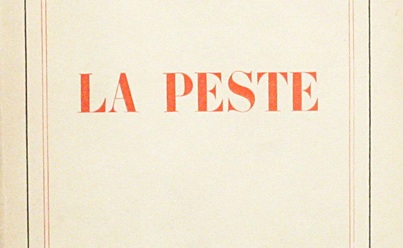Sudha Devi Nayak
‘La Peste’ or The Plague is the story of Oran, a French prefecture in the Algerian coast, told through the lens of the doctor narrator, Bernard Rieux, an unbeautiful place, “Treeless, glamourless, soulless” where people are chiefly interested in matters mercenary, living mundane lives, totally unprepared for the disaster to come. Into this city arrives the bubonic plague in the form of rats spewing blood, dying by the hundreds and thousands, clogging streets, pavements, gutters. It is a matter of time before the city’s populace is affected, the city is quarantined, and the people face the dreadful situation. A series of measures contain the citizens from their daily activities and many are in a state of disbelief, in wishful thinking and denial of reality. They say that the plague has vanished from the West and Camus adds sardonically “Yes everyone knew that except the dead.” But the pestilence comes to stay and their forced inactivity limiting their movements throws them on the illusive memories of the past and the lives that used to be.
A group of men stand up against the plague presenting the human response to calamity. Their lives and sorrows are meaningless in the face of the epidemic that unexpectedly interrupts their daily routine and into this scenario enter Dr Rieux and his band of men trying to save as many people as possible without hope but with empathy and commitment. “It is a never ending defeat.” It is the collective battle against human suffering, the triumph of the human spirit, the capacity to recover from tragedy, to contemplate and face death. Rieux says, “What’s true of all the evils in the world is true of a plague as well. It helps men to rise above themselves.” In this war against the plague there is no heroism and the only way to fight it is with common decency and decency meant doing ones job and relieving suffering. “There was nothing admirable about this attitude; it was merely logical.” Among the faithful volunteers for Rieux were Tarrou, a traveller held up in Oran on account of the plague, who maintained a diary of the daily happenings that gives texture to Rieux’s chronicle of the epidemic.
Tarrou is a philosopher with a tremendous personal and social responsibility towards amelioration of suffering and he seeks a larger peace than to be found in the preaching of Father Panaloux who believes the plague is a scourge of God and we must continue to believe in Him in the midst of suffering. There is Grand an elderly civil servant passed over at his workplace, with a broken marriage and trying to create the perfect manuscript but never going beyond the first line for want of the right words, giving a helping hand to the doctor. There is Rambert, the journalist who came on an assignment to the plague ridden city waiting for a way to rejoin his wife. When he gets an opportunity to leave he doesn’t, because he feels after what he has seen he belongs there with the doctor, and fighting the plague is everybody’s business. And yet exigencies of service make them liable to the disease they were fighting and they were “gambling on their luck and luck is not to be coerced.”
The work of Camus is a monument to human dignity and solidarity. The plague is not a punishment for anything deserved and it is difficult to understand the suffering of a child. “The agony of a child was humiliating to the heart and mind.” “Suffering is random, it makes no sense, it is no ethical force, it is simply absurd and that is the kindest thing one can say of it.” In Camus’ philosophy we are vulnerable to being randomly exterminated, by a bacillus, an accident or the actions of our fellow humans.
Rieux, all too human feels in the midst of his duties that a loveless world is a dead world and when one is weary of work and devotion to duty all one craves for is a loved face, the warmth and wonder of a loving heart. As the Plague runs its course and people are finding joy and life once again, Rieux receives the news his wife who was convalescing at the sanatorium out of Oran dies and he sees it as the extension of the suffering he has been witness to. In the end Rieux reflects, his experience of the plague translates to knowledge and memories of friendship and affection. The novel ends with a prophecy “the plague bacillus never dies or disappears for good; that it can lie dormant for years and years in furniture, and linen chests; that it bides its time in bedrooms, cellars, trunks, and bookshelves; and perhaps the day would come when for the bane and the enlightening of men, it roused up its rats again and sent them forth to die in a happy city.”

